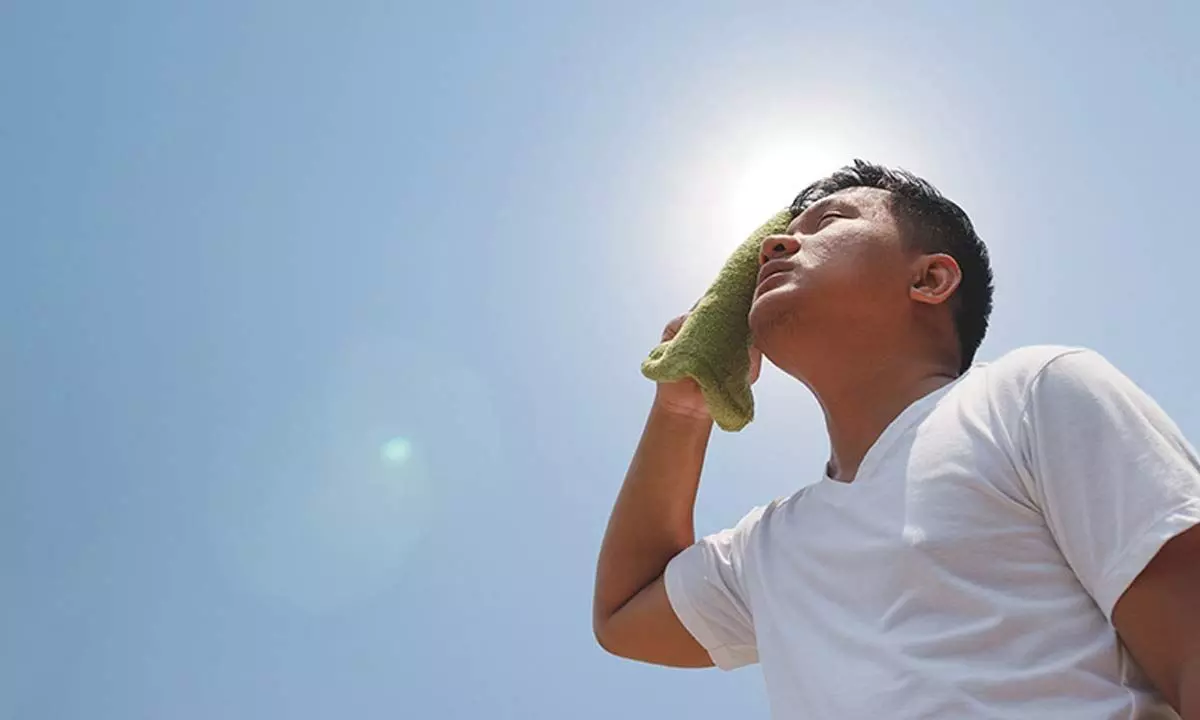Live
- GMR Airports Unveils AI-Powered Digital Twin Platform to Transform Airport Operations
- India poised to become leading maritime player: PM Modi
- Top Causes of Kidney Stones and How to Recognize Silent Symptoms
- India’s renewable energy capacity logs 14.2 pc growth at 213.7 GW
- Winter Session of Odisha Assembly adjourned sine die
- Biden calls Trump's tariff approach 'major mistake'
- After Drama Over Eknath Shinde’s Chief Minister Race, Maharashtra Cabinet Formation Faces New Tensions
- Egyptian FM, Blinken discuss recent developments in Syria
- Iran's supreme leader says Syria's developments result of US-Israeli 'plot'
- Elon Musk to Purchase $100 Million Luxury Mansion Next to Donald Trump's Mar-a-Lago, Report Reveals
Just In
Beat The Heat! Beware and prepare for heat related illness


For representational purpose
The role of hydration is very important, and people should maintain adequate hydration. Only water is not sufficient, body also needs electrolytes like Sodium, Potassium etc. Electrolytes are important for vital functions like maintaining water balance
Increasing global warming is resulting in extreme heat waves across India. According to research by the Lancet, India saw a 55% increase in deaths due to extreme heat between 2000-2004 and 2017-2021. The IMD report predicted a heat wave across most parts of India between April to June 2023. Over the recent weeks, temperatures in most parts of Andhra Pradesh and Telangana have breached 40° Celsius resulting in State Governments issuing advisories to manage the ongoing heatwave. Recently, Telangana government issued orange alert in 28 out of 33 districts.
Health implications of heat and key symptoms
A heat-related illness is a clinical spectrum of disorders that results from exposure to extreme environmental heat and the body’s inability to efficiently regulate heat. It can develop very rapidly and is not always obvious before it becomes life-threatening. Four main medical disorders resulting from excessive exposure to heat waves are as follows:
• Heat rash: Skin redness and pain with possible swelling, blisters
• Heat cramps: Painful spasms of leg and abdominal muscles associated with profuse sweating.
• Heat exhaustion: Fatigue, weakness, dizziness, headache, nausea, vomiting, muscle cramps and sweating
• Heat stroke: profound weakness; disorientation, convulsion or altered mental status
General guidance for management of heat related illnesses:
• Mild heat related illnesses like Heat rash, heat cramps can be managed with passive cooling and rehydration
• In case a person is suffering moderate heat related illnesses like heat exhaustion, the patient should be taken to cool place, loosen their clothes apply wet cloth and give sips of water
• For severe cases with a person witnessing a heat stroke, the patient should be immediately shifted to the nearest health centre. Until then shift victim to a cool place, sprinkle cold water, fan the individual and cold water sponging should be done.
• Heat edema involves mild swelling of feet, ankle and hands while prickly heat is associated with pruritic, maculopapular, erythematous rash typically over covered areas of body
Key measures to minimise impact of heat wave and associated heat related illness:
Some individual groups like senior citizen, children and pregnant women are more vulnerable to heat related illness and should be extra cautious during these months. It is important for susceptible individuals and their carers to have a basic knowledge of heat related illnesses and their prevention as well as first aid assistance may help mitigate the impending impact of heat wave.
The role of hydration is very important, and people should maintain adequate hydration. Only water is not sufficient, body also needs electrolytes like Sodium, Potassium etc. Electrolytes are important for vital functions like maintaining water balance. They are also important for functioning of important organs like heart, brain, muscles, and nerves. Recovery from heat-related illness can be supported by consumption of adequate fluids containing electrolytes. A drink with adequate fluid, electrolytes & energy replenishes the body with minerals that are commonly lost through sweat and help keep the body hydrated.
Other measures to prevent heat related illnesses:
• Avoid going & working out in the sun in afternoon.
• Use a hat and damp cloth on your head, neck, face, limbs if you work in the peak hours.
Use the night air to cool down your home. Open all windows and shutters during the night and the early morning when the outside temperature is lower. Close windows and shutters especially those facing the sun during the day
Wear lightweight, light-coloured, loose and porous cotton clothes
Use light bed linen and sheets to avoid heat accumulation
Use protective goggles, umbrella/hat, shoes or chappals while going out in sun.
Avoid alcohol, tea, coffee and carbonated soft drinks as they dehydrate the body
Eat small meals frequently. Avoid high-protein and stale food.
Use oral rehydration solutions which helps to re-hydrate the body
Take bath with cold water frequently
Seek medical help if you feel dizzy, weak, anxious or have intense thirst and headache. Move to a cool place as soon as possible
--Inputs from -Dr B. Ravinder Reddy. MS, FRCS (Edinburgh), FRCS (Glasgow), Gastrointestinal Surgeon, Hyderabad

© 2024 Hyderabad Media House Limited/The Hans India. All rights reserved. Powered by hocalwire.com






